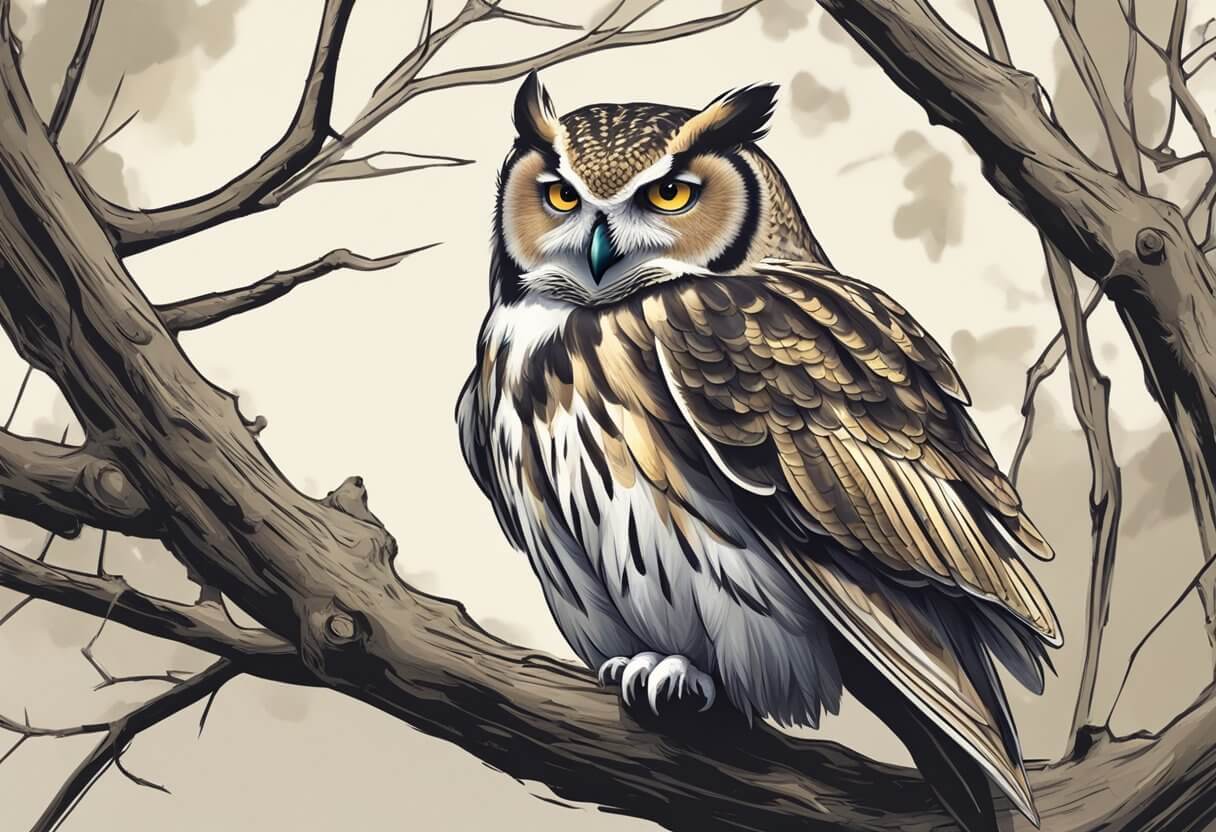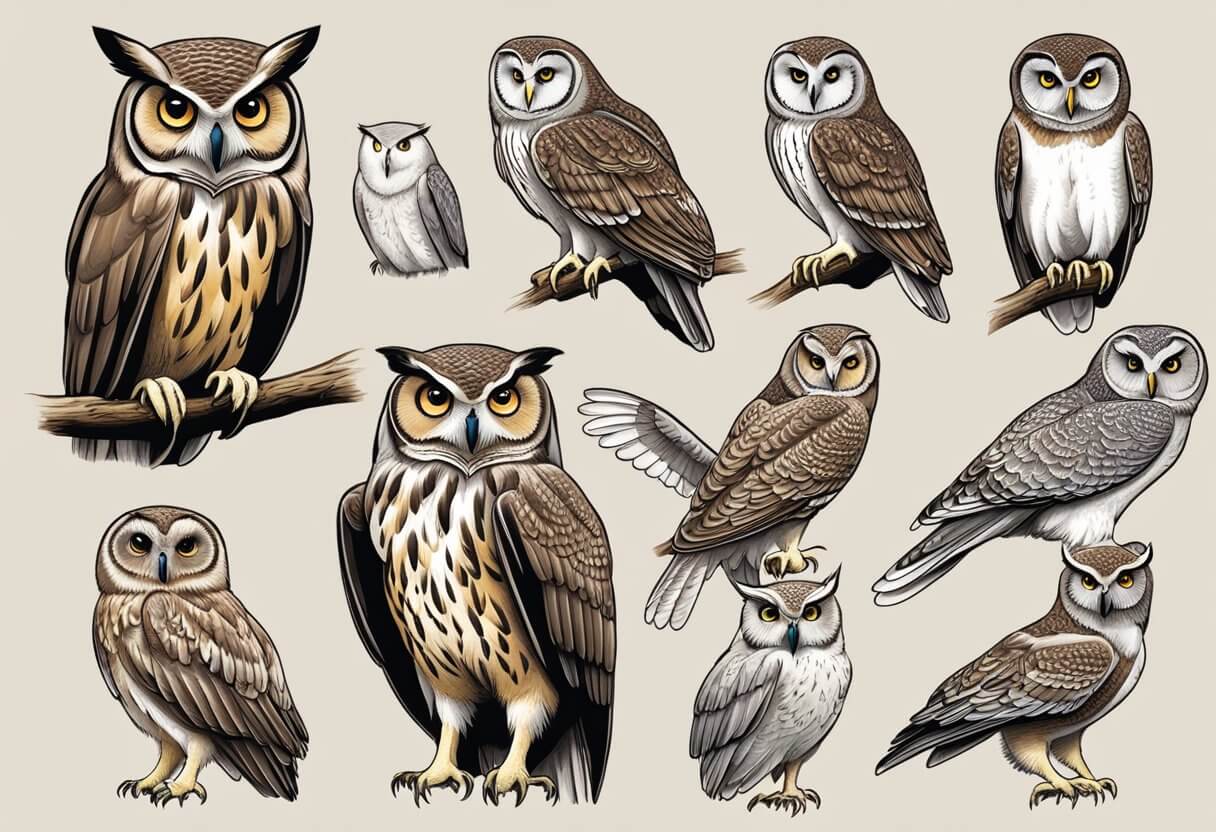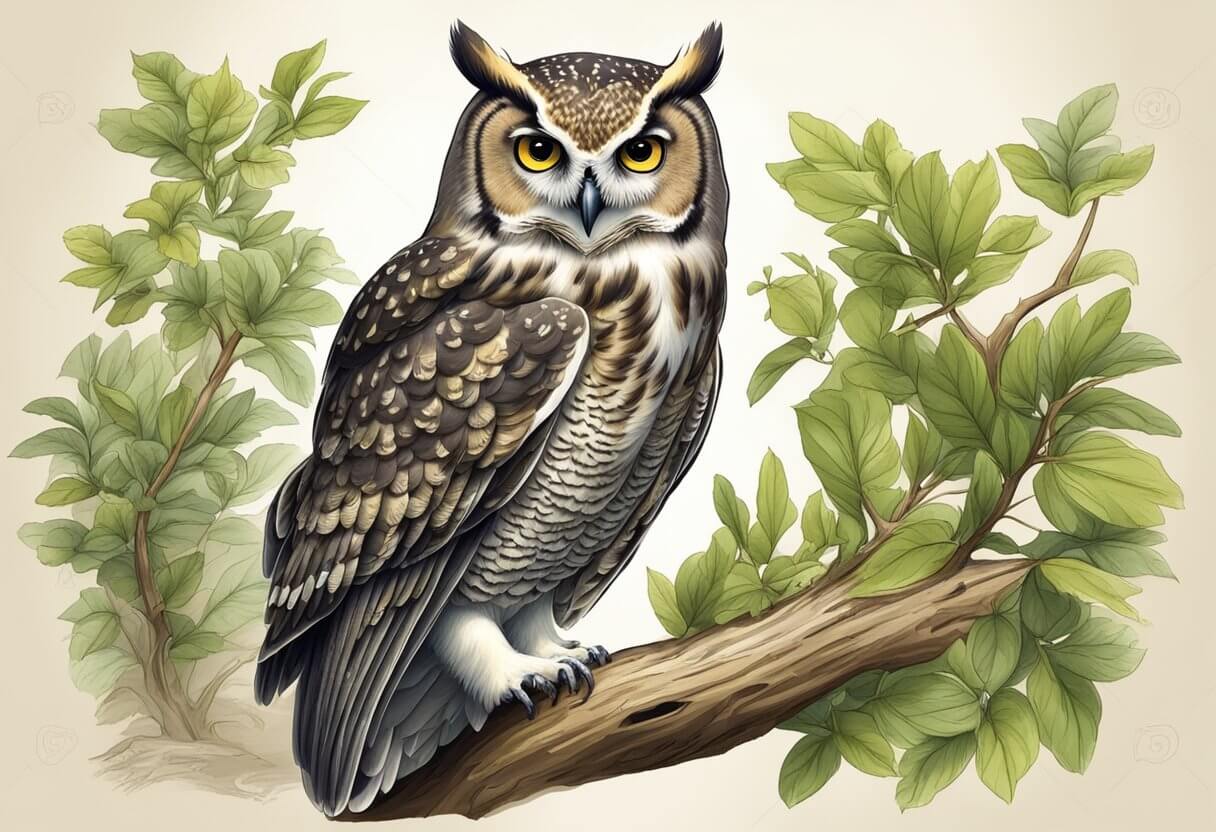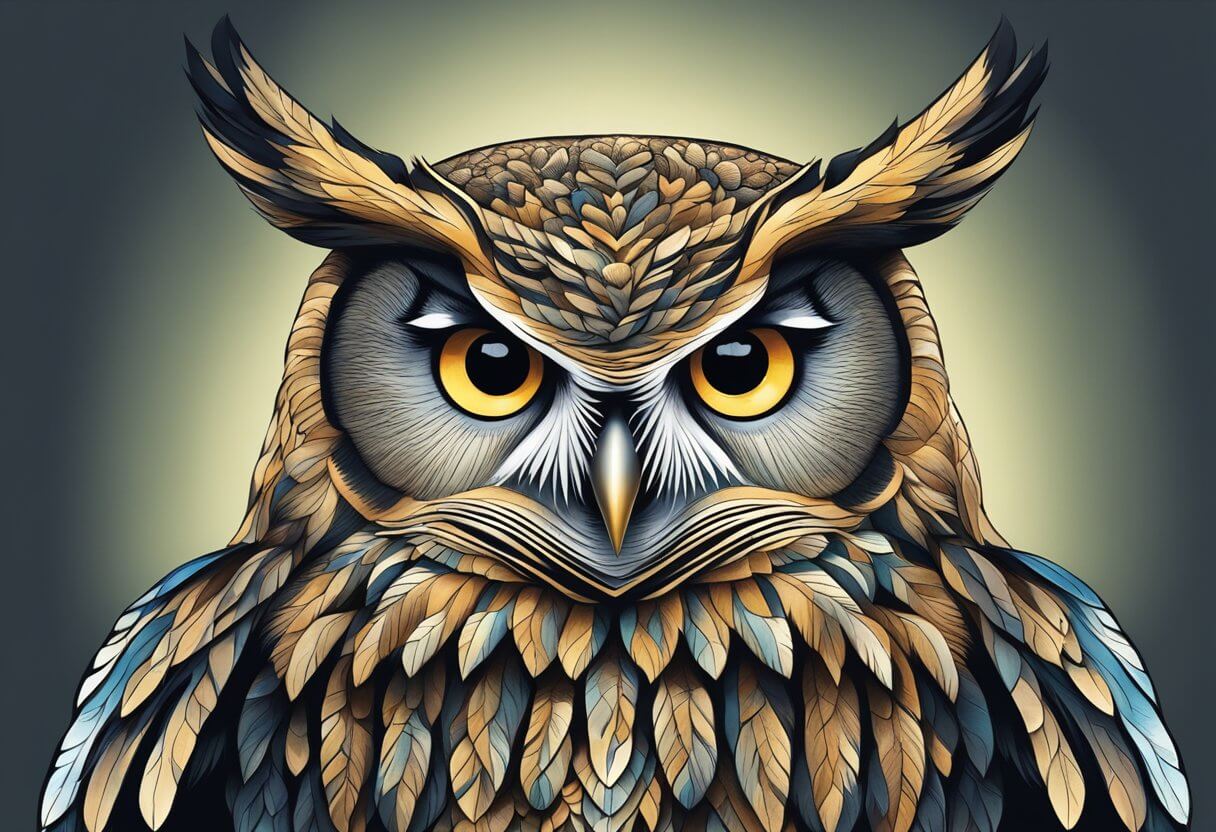The owl is a fascinating creature that has been mentioned in various cultures and religions throughout history.
In the Bible, owls are mentioned several times and are often associated with negative connotations such as desolation, emptiness, and destruction.
However, there are also instances where owls are seen as symbols of hope and faith.

According to Leviticus 11:16 and Deuteronomy 14:16, owls are considered unclean animals and are not to be eaten. In Isaiah 34:11-15, owls are mentioned in the context of a prophecy of the destruction of Edom.
The book of Job also describes the owl as a creature that dwells in desolate places and cries out at night. These passages have contributed to the negative associations that some people have with owls in the Bible.
Despite these negative associations, there are also instances where owls are seen in a positive light in the Bible.
In Psalm 102:6-7, the psalmist compares himself to an owl in the wilderness, indicating a sense of isolation and loneliness. However, the psalmist also expresses faith in God and hope for deliverance.
Additionally, some scholars suggest that the owl mentioned in Proverbs 30:17 may actually be a reference to an eagle or vulture rather than an owl.
Biblical Meaning of an Owl
Owls are mentioned several times in the Bible, and their symbolism is often associated with negative connotations. In the Old Testament, owls are considered unclean birds and are not to be eaten.
Beyond their physical features, owls are believed to carry deeper omens that can be interpreted as messages from God.
Unclean Birds
In Leviticus 11:16 and Deuteronomy 14:15, owls are listed among the unclean birds that should not be eaten.
The Hebrew word used to describe owls in these passages is “bath-haya’anah,” which means “daughter of greediness” or “shouting.”
This suggests that owls were viewed as birds that were noisy and demanding, and therefore, undesirable.
Symbol of Loneliness and Desolation
In addition to being unclean birds, owls are used figuratively in the Bible to symbolize loneliness, desolation, mourning, and judgment.
In Isaiah 34:13-15, owls are described as dwelling in desolate places, while in Job 30:29, they are associated with mourning and sorrow.
The use of owls in these passages suggests that they were seen as birds that were associated with death and despair.
Messenger of God
Despite their negative symbolism, owls are also believed to be messengers of God in the Bible. In the book of Proverbs, for example, an owl is described as God’s special messenger.
Whenever an owl appears, it is as if God has come into the situation. This suggests that owls can be seen as a sign of God’s presence and guidance, even in difficult times.
Associated with Darkness
Owls are also associated with darkness in the Bible. In Jeremiah 50:39, for example, owls are said to dwell in desolate places and abandoned cities, which are often associated with darkness and evil.
This suggests that owls were seen as birds that were associated with the unknown and the mysterious, and therefore, were often feared.
Wisdom
Finally, owls are sometimes associated with wisdom in the Bible. In Job 12:7-10, for example, owls are described as creatures that have knowledge and understanding.
This suggests that owls were seen as birds that were wise and knowledgeable, and therefore, were respected.
Overall, the biblical symbolism of owls is complex and multifaceted. While they are often associated with negative connotations such as desolation and loneliness, they are also seen as messengers of God and symbols of wisdom.
Read too: Biblical Meaning of Birds Flying in Front of You
Biblical References to Owls

Owls are mentioned several times in the Bible, both in the Old and New Testaments. In this section, we will explore the various references to owls in the Bible.
Old Testament References
In the Old Testament, owls are often associated with desolation, loneliness, and mourning. For instance, in Isaiah 34:13-15, owls are mentioned along with other creatures that inhabit desolate places:
“Thorns shall grow over its strongholds, nettles and thistles in its fortresses. It shall be the haunt of jackals, an abode for ostriches.
And wild animals shall meet with hyenas; the wild goat shall cry to his fellow; indeed, there the night bird settles and finds for herself a resting place.
There the owl nests and lays and hatches and gathers her young in her shadow; indeed, there the hawks are gathered, each one with her mate.”
Similarly, in Jeremiah 50:39, owls are mentioned in the context of desolation and destruction:
“Therefore wild beasts shall dwell with hyenas in Babylon, and ostriches shall dwell in her. She shall never again have people, nor be inhabited for all generations.”
Owls are also mentioned in Leviticus and Deuteronomy as unclean birds that the Israelites were not supposed to eat. In Leviticus 11:16, the horned owl is mentioned:
“the little owl, the short-eared owl, the long-eared owl, the hawk of any kind.”
And in Deuteronomy 14:15, the owl is mentioned along with other unclean birds:
“the ostrich, the nighthawk, the sea gull, the hawk of any kind.”
New Testament References
In the New Testament, owls are not mentioned as frequently as in the Old Testament. However, in the Gospel of Matthew, Jesus refers to owls in the context of worry and anxiety:
“Therefore I tell you, do not worry about your life, what you will eat or drink; or about your body, what you will wear. Is not life more than food, and the body more than clothes?
Look at the birds of the air; they do not sow or reap or store away in barns, and yet your heavenly Father feeds them. Are you not much more valuable than they?” (Matthew 6:25-26)
This passage suggests that we should trust in God to provide for our needs, just as he provides for the needs of the birds, including owls.
In conclusion, while owls are not a major theme in the Bible, they are mentioned several times, often in the context of desolation, loneliness, and mourning.
Owls are also mentioned as unclean birds that the Israelites were not supposed to eat. In the New Testament, Jesus refers to owls as an example of how we should trust in God to provide for our needs.
Symbolism of Owls in the Bible

Owls are mentioned in the Bible as symbols of various things, including desolation, sin, judgment, and wisdom. Here are some of the ways in which owls are used as symbols in the Bible:
Owls as Symbols of Desolation and Loneliness
In the Bible, owls are often associated with desolate and lonely places. For example, in Isaiah 13:21, it says, “But wild beasts of the desert shall lie there; and their houses shall be full of doleful creatures; and owls shall dwell there, and satyrs shall dance there.” This passage suggests that owls are a sign of utter desolation and chaos.
Owls as Symbols of Sin and Judgment
In Leviticus 11:13-19, owls are listed among the unclean birds that the Israelites were not allowed to eat.
This suggests that owls are a symbol of sin and impurity. In addition, in Isaiah 34:11-15, owls are used as a symbol of God’s judgment.
This passage describes a scene in which God is punishing the nations, and it says, “And the wild beasts of the desert shall meet with the wild beasts of the island, and the satyr shall cry to his fellow; the screech owl also shall rest there, and find for herself a place of rest.”
Owls as Symbols of Wisdom and Knowledge
Despite the negative connotations that owls have in some parts of the Bible, they are also used as symbols of wisdom and knowledge. In Psalm 102:6, the psalmist says,
“I am like an owl of the wilderness, like a little owl of the waste places.” This suggests that the psalmist sees himself as a wise and knowledgeable creature, like an owl.
In addition, in Proverbs 30:17, the wise man Agur says, “The eye that mocks a father and despises a mother’s instructions will be plucked out by ravens of the valley and eaten by vultures.”
The Hebrew word for “ravens” in this passage is “owls,” which suggests that owls are a symbol of divine wisdom.
Overall, while owls are used as symbols of both negative and positive things in the Bible, they are most often associated with desolation and judgment.
However, they are also sometimes used as symbols of wisdom and knowledge, particularly divine wisdom.
Owl Species Mentioned in the Bible

The Bible mentions several species of owls, each with its own unique characteristics and symbolism. Here are some of the owl species mentioned in the Bible:
Great Owl
The Great Owl, also known as the Horned Owl or the Eagle Owl, is the largest species of owl mentioned in the Bible.
It is known for its distinctive ear tufts and powerful talons, which make it a formidable predator.
In the Bible, the Great Owl is often associated with desolation and destruction, and is considered an unclean bird.
Little Owl
The Little Owl is a small species of owl that is native to the Middle East. It is known for its distinctive appearance, which includes a round head and large, bright eyes. In the Bible, the Little Owl is also considered an unclean bird, and is often associated with loneliness and mourning.
Screech Owl
The Screech Owl, also known as the Barn Owl, is a medium-sized species of owl that is found throughout the world. It is known for its distinctive screeching call, which can be heard at night.
In the Bible, the Screech Owl is often associated with desolation and destruction, and is considered an unclean bird.
Eagle-Owl
The Eagle-Owl, also known as the Great Horned Owl, is a large species of owl that is found throughout the world.
It is known for its distinctive hooting call, which can be heard at night. In the Bible, the Eagle-Owl is often associated with desolation and destruction, and is considered an unclean bird.
Overall, the various species of owls mentioned in the Bible are often associated with desolation, loneliness, and destruction.
They are considered unclean birds, and are often used figuratively to symbolize torment and judgment.
Read too: Dove Biblical Meaning: Symbolism and Significance in Christianity
Cultural Interpretations of Owls

Native American Interpretations
In Native American culture, the owl is a symbol of wisdom, foresight, and intuition. The bird is considered a messenger of secrets and hidden knowledge. Some tribes believe that hearing the call of an owl at night means that death is near.
The Hopi people, for example, believe that the owl is a messenger of the underworld and a symbol of death and darkness. However, other tribes such as the Cherokee and Apache view the owl as a protector and a symbol of good luck.
African Cultural Interpretations
In African culture, the owl is often associated with witchcraft and sorcery. The bird is seen as a messenger of death and a symbol of darkness and evil. Some tribes believe that the owl is a harbinger of bad news and a sign of impending danger.
However, other African cultures view the owl as a symbol of wisdom, knowledge, and foresight. The Yoruba people, for example, believe that the owl is a messenger of the god of wisdom and a symbol of intelligence and foresight.
Overall, the cultural interpretations of owls vary widely across different cultures and traditions. While some view the bird as a symbol of death and darkness, others see it as a messenger of wisdom and knowledge.
The meaning of the owl in a particular culture depends on the beliefs and values of that culture, as well as the specific context in which the bird appears.
Interpreting Owl Encounters
Encountering an owl can be a powerful experience, and it is natural to wonder what it might mean. In the Bible, owls are often associated with desolation, emptiness, and loneliness.
However, they can also symbolize hope, faith, and divine guidance. Here are a few common owl encounters and what they might signify.
Owl Visits Your Home
If an owl visits your home, it could be a sign of impending change. This change could be positive or negative, but it is important to remain open and receptive to the opportunities that are presented.
Owls are also associated with wisdom, so this visitation could be a reminder to trust your intuition and make wise decisions.
Owl Crosses Your Path
If an owl crosses your path, it could be a sign that you are on the right track. Owls are known for their keen vision and ability to navigate in the dark, so this encounter could be a reminder to trust your own instincts and persevere in the face of adversity.
Alternatively, it could be a warning to slow down and take a closer look at your surroundings before making any major decisions.
Owl in Your Dreams
Dreaming of an owl can be a powerful experience. In many cultures, owls are associated with the spirit world and are believed to bring messages from beyond. If you dream of an owl, pay attention to the details of the dream.
What is the owl doing? How does it make you feel? These details can help you interpret the message that the owl is trying to convey.
Overall, encountering an owl can be a powerful experience with many possible meanings.
By remaining open and receptive to the messages that owls bring, you can gain valuable insights and guidance on your spiritual journey.